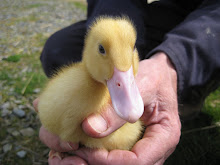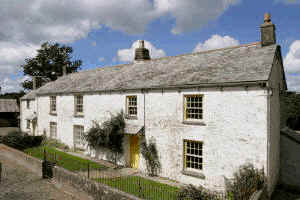Working every hour of daylight to reap a harvest barely adequate for your own needs, literally breaking your back to support a family, it's not surprising that subsistence farmers crave a less knife-edge existence. But why do so many people have such a strong desire to get back to the land? Is there some sort of as yet unfound rural gene? A farmyard chromosome? Is modern, urban life ultimately so unsatisfying that we require, after all, a simpler life dictated by seasons and the inevitable turn of sowing and harvest?
The stories of celebrities turning farmer are endless: Jeremy Clarkson, Rosie Boycott, Alex James, Jody Scheckter and Janet Street Porter, to name a few, and Hugh Fearnley Whittingstall, Adam Henson and Jimmy Docherty are household names. And the only difference between most celebrities and the rest of us is that they have the money to do what the rest of us would like to do, only more quickly, on a more lavish scale, and certainly with more help (aka employees).
So, is the meaning of life only to be found in growing your own herbs, rearing your own pigs and plucking an egg fresh from the nest? Have we all been watching too many episodes of Lark Rise to Candleford? Are we succumbing to some ghastly social engineering of bucolic brainwashery? I don't think so.
There are times in life when your gut twists with worry and working at a computer or hanging on the phone to yet another call centre worker is no balm. But walking the land, breathing the air, handling livestock, producing your own food, working outside til dark, having something beautiful to wake up to in the morning, these are things that genuinely do ease stress. It's not about brain (city) versus brawn (country) either. I have found nothing as intellectually challenging as farming; there is always more to learn, more to observe, more to discuss. And as for brawn, I'd rather handle 150 sheep than fill 150 boxes for an office move, any day.
Of course, living in this beautiful place, running a farm, I enjoy that happiness that only the land and nature seems able to give, and have been lucky enough to realise it. Running our smallholding courses, we meet hundreds of people who are also convinced that an office based life is basically drudgery, no matter how well paid, and that wielding a shovel or a sledge hammer is truly satisfying if that shovel is being used for some smallholder or farmer task; a pickaxe used for mending roads on the other hand is just hard labour.
Can I pinpoint why we want to be on the land, want to farm? Well, discussing it with our course participants and friends, there would appear to be some fundamental truths, not all of which would be shared by some large scale commercial farmers, many of whom seem to never eat their own produce. But that aside, what are those drivers?
- Having an absolute sense of the seasons soothes in that it creates routine as well as change - there are summer tasks such as haymaking that happen every year, but then you shift to autumn and your chores alter, keeping your interest, calling up different skills. I suspect people thrive on this mix of routine and variety.
- Being in control of your own life and not worrying about starving as a consequence - in tougher times I might not be able to buy a pair of shoes but there's always meat in the freezer and veg and fruit in the garden.
- Knowing exactly where your food has come from, what it contains and what you are putting in your family's stomach - and rearing and growing what you like to eat best; asparagus and steak, chillis and cheese, petits pois and omelettes.
- The absence of concrete, and therefore of the manufactured. When I'm in the city it feels as if I'd need to dig down for yards to find earth. At home there is soil, and the grass grows up to the front door. I know that a farm is a completely man-made environment, but if farmed sympathetically it develops with, not against nature. Lay a hedge as a livestock barrier and it regrows, sprouting green a few months later.
- The annual round of birth - lambing, hatching, calving, farrowing. It might be destined as meat but there is real joy in being responsible for healthy births. And death too; on a livestock farm it is inevitable and with that comes, perhaps, a more relaxed acceptance of your own mortality.
- An extraordinary sense of achievement, not just once in a blue moon, but regularly. Every egg you collect, every lamb or calf that grows on well because of good husbandry, the hedges you lay, the wildlife that thrives, the trees planted, the orchard that fruits. So much more rewarding than a "well done" from a boss. So necessary to a worthwhile existence.
- And you get that sense of achievement because it's challenging. It's not easy, doing many of the jobs on a farm. You need a number of skills and a can do attitude. It doesn't pay to be smug (is it ever?) because there will be something even more challenging just around the corner that could well trip you up, financially or literally.
- Time. Yes, we can work very long days, but if it's a nice day we can take the dogs to the beach or up on the moors. We can stop and chat with friends not for two minutes but for an hour, if nothing is too pressing. The to do lists are crazy, but if it's monsooning it down, you go and do something in a shed or the house.
















